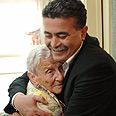
Voter turnout rate: Only 47%
With four hours to go, Central Elections Committee says only 47 percent of eligible voters cast ballots, compared to 53 percent in previous elections; pollster expects figures to pick up later in the evening
(VIDEO)- Only 47 percent of eligible voters cast their ballots by 6 p.m. Tuesday, the Central Elections Committee reported.
The latest figures are particularly low when compared to previous elections. In 2003, the voter turnout rate stood at 52.8 percent at this time.
Netanyahu votes in Jerusalem (Video: Ohad Ortal, Studio Edi-Boy)
Earlier, frontrunner Kadima, which expressed concern about a low turnout rate before the elections, sent thousands of text messages calling on Israelis to hit the polls.
Pollster Rafi Smith, who will be preparing Ynet's Election Day poll, noted that "low turnout rates are common for these hours."
"Elections in Israel traditionally pick up between 5 to 8 p.m., those are the 'hotter' hours," he said. "In the past we had high turnout rates early in the morning as well, particularly older people, but in recent years most of the voting begins in the afternoon."
According to Smith, the gap between the current elections and the last ones is not particularly large.
"We must always remember that the total number of voters is lower than what the official lists say. There are many people who don't live in the country, are traveling, people who died…all those are recorded as eligible voters but they won't be voting, and therefore the number of people counted should be reduced by about half a million, because they're simply irrelevant," he said.
Low turnout: Who will gain?
So who will gain from a low voter turnout rate? Smith says that some parties would get a boost as a result of the low turnout figures.
"If the turnout rate at the Arab sector would be low, for example, it would be easier for Jewish parties in general and for small Jewish parties in particular. It can lead to one of the Arab parties not crossing the threshold."
"In addition, parties who have better organization, such as Shas, United Torah Judaism, Israel Our Home, Labor, and Likud – this would greatly help them," he said. "Kadima has no organizational infrastructure like the others, and it has no experience."
Professor Avraham Diskin of the Elections Committee said earlier that the voter turnout rate bares no indication to what is expected throughout the day, as during the 2001 elections some 11 percent of Israelis voted by 10 a.m., but only 62 percent voted by the end of the day – the lowest turnout rate ever registered in the country.
Later, as the turnout rate continued to drop, Diskin said “it is clear that the last three elections have seen a drop in the voter turnout rate.
“Perhaps the turnout rates are decreasing due to the public’s distrust in the system,” he said.
Olmert casts ballot in Jerusalem (Video: Edi-Boy)
Ehud Olmert was the first candidate to vote, as he arrived with wife Aliza at a voting station near his Old Katamon neighborhood home in Jerusalem. Labor Chairman Amir Peretz and wife Ahlama cast their ballots in Sderot. Likud Head Benjamin Netanyahu chose to tour the Gilo neighborhood in Jerusalem, where he was welcomed with cheers by the residents. He and wife Sarah later voted at the Paula Ben-Gurion school in Jerusalem's Rehavia neighborhood.
“I hope the Likudniks will come out of their homes.” Bibi said calling on party supporters to “put the coffee mugs and any other considerations aside and go vote.”
Peretz exercises his democratic right in Sderot (Video: Dalit Shaham)
Prior to casting his vote Peretz met in Sderot with 85-year-old Holocaust survivor Fircha Hermel.
“I come to see her when I need to gather strength, and after all she’s been through, she is a symbol of this city.”
Voting in Tel Aviv (Video: Shai Rosenzweig)
Hermel said “I blessed him before he became Labor party chairman; I hope he will be the next prime minister.”
At 7 a.m. Tuesday polling stations opened all across the country. More than five million Israelis are eligible to vote at the 8,280 stations, which will remain open until 10 p.m., after which the exit polls will be published.
In order to ensure the celebration is not spoiled, security forces have deployed in force across the country, with police declaring the highest state of alert and sending about 22,000 officers to boost security across Israel.
Kadima’s no. 2 Shimon Peres voted in the “Arazim” school in Ramat Aviv; he said voting in the elections is crucial as “these elections will determine the country’s character, borders and moral identity.”
Shas spiritual leader Rabbi Ovadia Yosef cast his vote in the ultra-Orthodox neighborhood of Har Nof in Jerusalem, after which he said “voting is a mitzvah.”
Foreign Minister Tzipi Livni, who cast her ballot at the “Misgav” school in Tel Aviv, said “the truth is that the person I miss most here is (Prime Minister) Arik Sharon, the man who dreamt of and planned this day.”
President Moshe Katsav cast his ballot at a voting station near his Jerusalem residence. He said that he plans on beginning consultations on the new government before the official election results are in.










